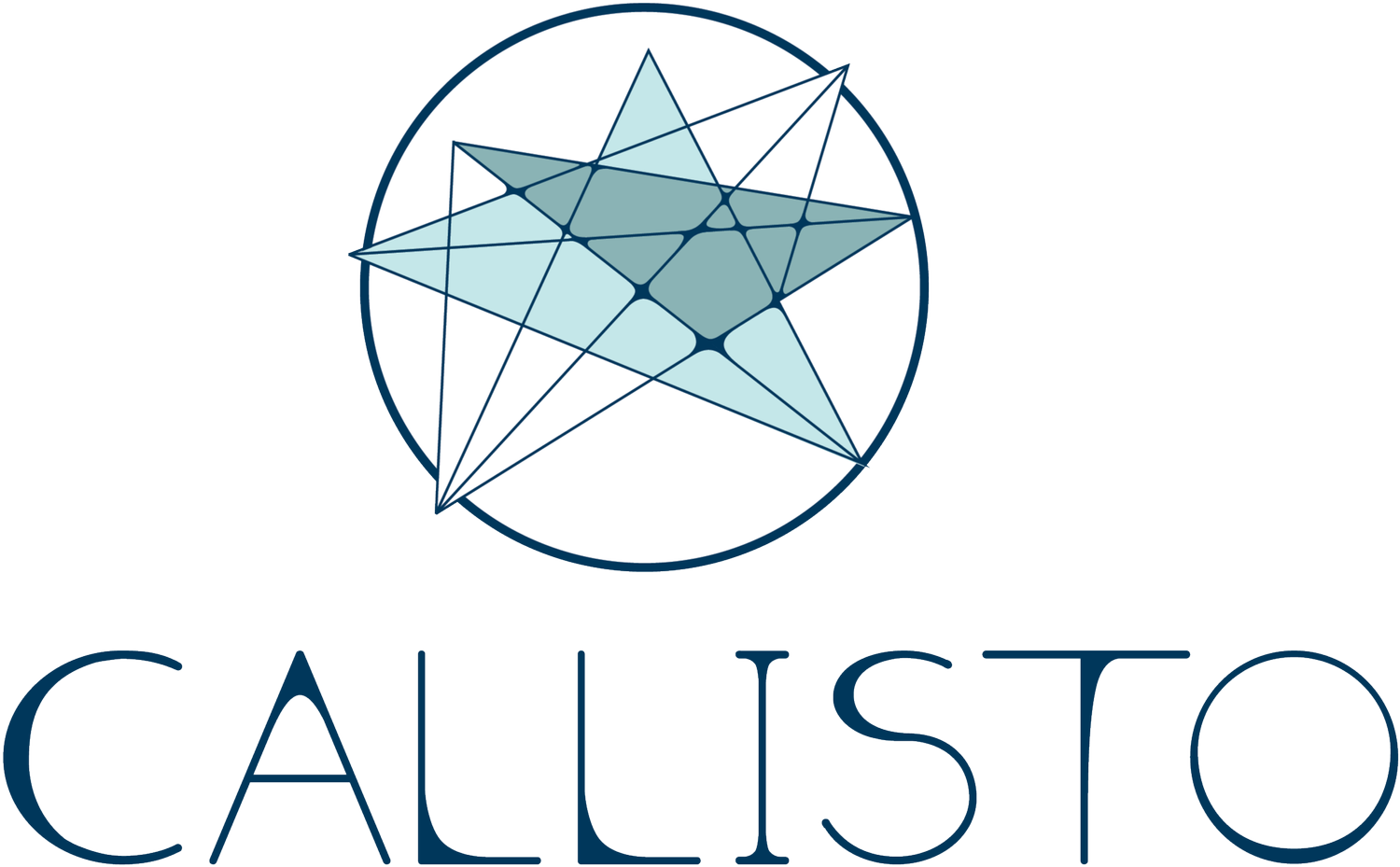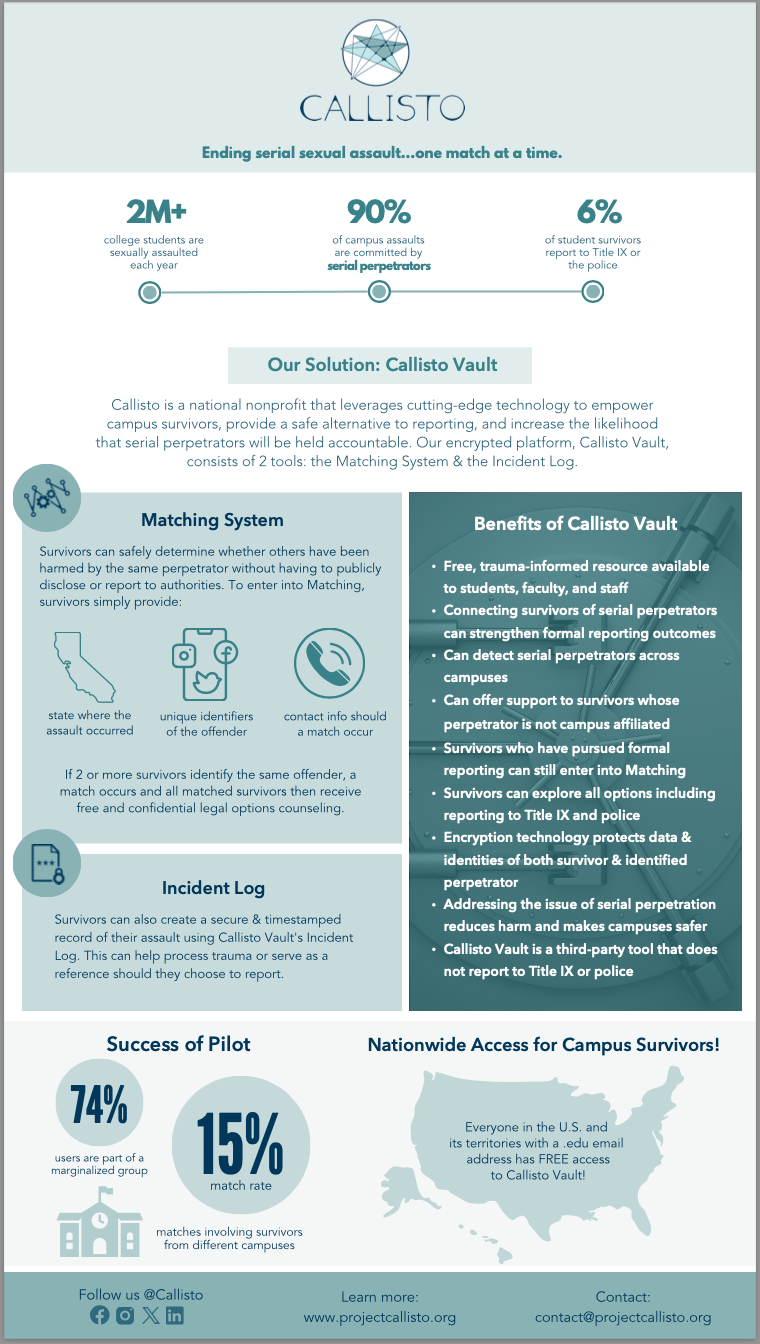Thank you for visiting our administrator and campus staff page! The fact that you're here shows that you truly care about addressing sexual assault on your campus and empowering survivors. You may have heard about Callisto’s innovative solution to address serial perpetration on college campuses and may be thinking:
Callisto Vault is a game changer and I want to support or get involved on my campus.
I am looking to expand the resources available on campus and I think Callisto Vault would be a great addition.
Callisto Vault sounds like a very interesting tool and I have some questions or concerns.
These are all valid thoughts and we designed this page to answer your questions and support your ability to get involved with our work. Let’s start with the WHY of our work. While many campuses are addressing sexual violence through prevention programming and post-assault resources, they often overlook the impact of serial perpetrators. Here is a deeper dive on the issue of serial perpetration:
McWhorter et al. (2009) found that 13% of participants engaged in actions that met the definition of attempted or completed rape. Of that 13%, 71 percent engaged in more than one attempted rape with an average rate of 6.5 incidents.
Swartout et al. (2015) found that 10.8% of participants reported having perpetrated at least 1 rape from 14 years of age through the end of college.
Foubert et al. (2020) found that more than 87% of alcohol-involved sexual assault incidents were committed by serial perpetrators, who committed an average of at least five incidents each.
Studies have found that 4-16% of college men admit, on anonymous or confidential surveys, to having committed at least one rape or attempted rape (Lisak & Miller, 2002; Abbey et al., 2012; Thompson et al., 2013).
Although studies about serial perpetration are limited, many administrators have dealt with cases where multiple survivors have named the same offender and struggled to find ways to address harm in a survivor-centered manner. Well guess what? Callisto Vault offers survivors with a .edu email address a confidential and secure way to know if their perpetrator harmed another person, whether or not they choose to report. This can establish a pattern of evidence that has the potential to increase justice and accountability outcomes for those perpetrators who are causing harm – ultimately reducing sexual assault on college campuses.
To learn more about the issue and Callisto Vault, we encourage you to check out our 1-pager, success measures, and FAQ section.
Success Measures for Callisto Vault
15% of submitted matching entries during our 2 year pilot resulted in a match.
74% of users self-identified as part of one or more marginalized groups.
We have detected matches involving survivors from different campuses and on different coasts.
We have detected matches that involve more than two survivors.
Frequently Asked Questions
-
Anyone with an active .edu email address at a college or university in the United States and its territories has free access to Callisto Vault. This would include faculty, staff, students, and may extend to alumni depending on your campus’s alumni email management policies.
-
Access to Callisto Vault does not come at any cost to your institution. We invite you to create your free account today!
-
Callisto and Callisto Vault are not connected in any way to the college/university so a survivor has ultimate control over their next action step(s). Some survivors are more comfortable using off-campus resources and some survivors are more comfortable interacting with technology as a first step towards healing and justice. We exist to support these survivors.
-
Callisto Vault’s Matching System is unique because it enables survivors who have been harmed by the same serial perpetrator(s) to securely and safely connect to each other, without needing to report or publicly identify themselves. Additionally, survivors can enter into Matching regardless of who the perpetrator is or where the incident occurred, which expands options for those ineligible to file a Title IX complaint.
-
No. We are very explicit about Callisto Vault not being a reporting service. Use of our services does not prompt any notifications or generate reports to any authorities. Any and all formal actions taken must be initiated by the survivor outside of the platform.
-
Our Legal Options Counselors (LOCs) discuss all available options with survivors including reporting to Title IX and law enforcement, criminal and civil cases, and on- and off-campus resource referrals.
-
Our Legal Options Counselors (LOCs) can provide a general overview of how the Title IX process works and the rights survivors have under Title IX. If a survivor is interested in pursuing this option, our LOCs will direct the student to reach out to their campus Title IX office to learn about the nuances of your campus’s Title IX process and supportive measures available.
-
Yes. We invite you to share information about the resources and Title IX process at your school to help our LOCs better speak to the options survivor’s have on your campus. If you would like to share resources for your campus, please send them to partnerships@projectcallisto.org.
How can you support our work?
The answer is simple. Help us increase visibility of Callisto and usage of Callisto Vault on your campus. We invite you to download the “Campus Awareness Building Guide” as a guidepost for how to successfully integrate Callisto Vault into your campus community.
Campus Awareness Building Guide
Looking to spread awareness on campus, but not sure how to get started? This comprehensive guide includes a campus awareness building checklist, as well as a campus announcement template, and course syllabus language.
For additional resources and materials to support awareness building on your campus, please download our toolkit.



